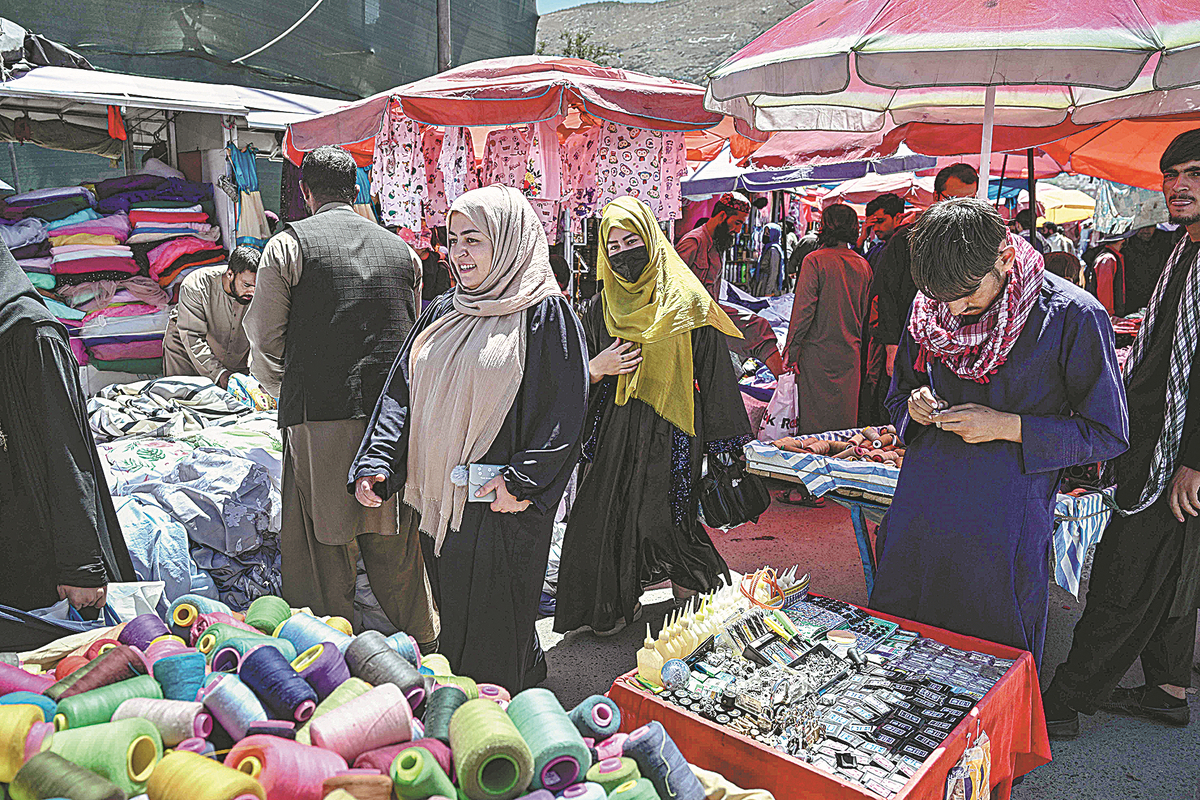US keeps the pain coming for Afghans
By XU WEIWEI in Hong Kong | China Daily | Updated: 2022-08-15 09:51

Refusal to unfreeze billions in assets piles misery onto nation, experts say
The dire economic problems that the United States left behind for Afghans, following the chaotic withdrawal of US-led forces from the country last year, have been exacerbated by Washington's financial strangling of the war-torn country, analysts say.
While Afghanistan suffers, the US also has little to show for its efforts in the so-called fight against terrorism, the pretext for its invasion of the country two decades ago and the subsequent occupation by its military.
The headline-grabbing assassination last month of a terrorist leader who no longer seemed to pose a threat to the US cannot mask its failures in the name of anti-terrorism in Afghanistan.
Aside from al-Qaida, with its continued presence in Afghanistan in the form of ISIS-K, the Tehrik-e-Taliban Pakistan and other nonstate actors involved in terrorist activities remain a concern to the world, said Salman Bashir, a former Pakistani ambassador to China. That "these elements survived 20 years of NATO and US presence in Afghanistan is evident", he said.
Despite the US' killing of al-Qaida leader Ayman al-Zawahiri in the drone strike in Kabul on July 31, terrorism is still yet to be uprooted. If anything, there is an even greater threat now than at the time the US invaded in 2001.The Taliban government has protested against the drone attack that violated Afghan sovereignty.
The Action on Armed Violence group in London had recorded 31 incidents of explosive violence in Afghanistan for the year to May 26, with 237 deaths among the 654 civilian casualties.
In one of the deadliest blasts this year, 33 people were killed when a bomb targeting worshippers in a mosque went off in Kunduz on April 22, Dubai's Arabiya news channel reported.
The US clearly did not achieve its objectives during its occupation of Afghanistan, said Imtiaz Gul, executive director of the Center for Research and Security Studies in Pakistan.
"The fact is that you can kill the leader (of a transnational group), but not the ideology, which other people embrace and use to continue their mission. So the real challenge is knowing how to neutralize the ideology that keeps people motivated."
Amina Khan, director of the Centre for Afghanistan, Middle East and Africa at the Institute of Strategic Studies Islamabad, considers al-Zawahiri "at best, a symbolic threat limited to propaganda jihadist videos". The terrorist group had for some time ceased to be a major concern of those engaged in counterterrorism.
"The erstwhile most dangerous terrorist group in the war on terror following its attacks on the United States on Sept 11 had largely been inactive, particularly in Afghanistan," Khan said.
Al-Zawahiri, who took over the leadership of al-Qaida after Osama bin Laden was killed in 2011, had served as "a constant reminder of the US failures in the war against terror". His assassination has significance for giving only a minute of "victory" to the US and President Joe Biden, Khan said.
Khan said that the killing came against the backdrop of plunging approval ratings for Biden and widespread criticism of the US administration both in and outside the country.
Bashir said the "Taliban government faces multiple problems and needs international assistance to deal with grave economic and security issues".
Hypocrisy highlighted
The failure of the US to deliver even a third of the Afghan financial assets that it froze last year has also been widely criticized as exposing US hypocrisy when it comes to humanitarian assistance. Its actions show that Washington is intent on financially paralyzing efforts by the Taliban to improve the economy, observers say.
The US froze around $9.5 billion of Afghanistan's assets held overseas after the US troop withdrawal in August last year. Biden signed an executive order in February that sought to split $7 billion in Afghan assets between funding humanitarian aid for the cash-strapped country and creating a trust fund with $3.5 billion to compensate the victims of the Sept 11 terrorist attacks.
But the US has been hesitant in letting the Taliban government have some of the money. By doing so, Washington has been accused of breaking international laws and practices relating to state property.
Last month, a US delegation met with Taliban officials to discuss unfreezing part of the Afghan central bank reserves, with little progress since. The US inaction has prolonged the suffering of Afghanistan's impoverished and starving people and hindered its economic recovery.
Gul said unfreezing the US-held funds would enable the Afghan central bank to stabilize the Afghani, the nation's currency, which has fallen more than 15 percent against the US dollar. The release of the funds would help the country pay for imports and provide liquidity to the banking system.
"Injecting money back into the Afghan private banks would allow individuals to access personal accounts, and restore their purchasing power to help overcome hardships they are facing in the wake of rising inflation," he said.
Afghans regard the US freeze on the assets as theft. The frozen assets belong to the Afghan state and the Afghan masses who are suffering, Khan said.
Afghan people "are going through huge economic constraints, inactivity", and "let us not forget the humanitarian and natural disasters and calamities that they continue to suffer from", Khan said.
























